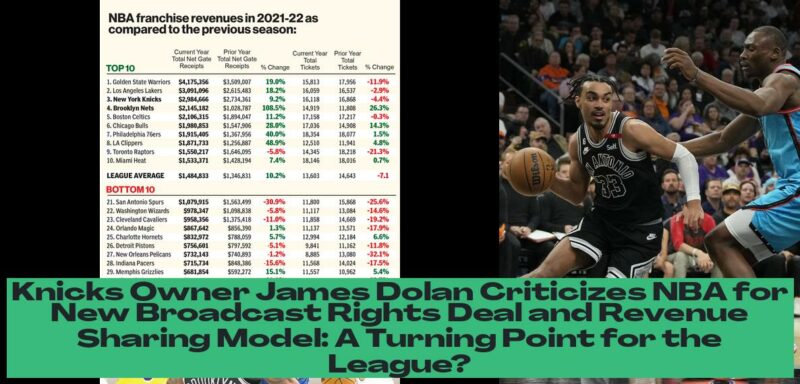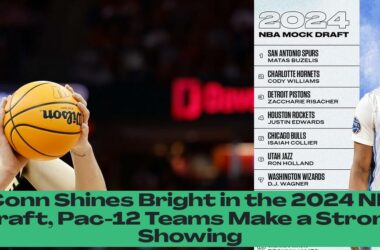Knicks Owner James Dolan Unleashes Fury on NBA’s New Broadcast Rights Deal and Revenue Sharing Model
James Dolan, the outspoken owner of the New York Knicks, has never been one to shy away from controversy. And his latest salvo, a scathing letter to the NBA’s board of governors, is sure to make waves in the league. In the letter, Dolan rips into the NBA’s new broadcast rights deal and accuses the league of prioritizing nationalization over local markets, effectively “deemphasizing and depowering the local market.”
Dolan’s anger stems from the league’s decision to prioritize national television partners, such as ESPN and Turner Sports, at the expense of regional sports networks (RSNs). He argues that the increased number of exclusive and non-exclusive games for national broadcasts will make it difficult for RSNs to survive, potentially rendering the entire model unviable. This move, according to Dolan, is a direct attack on the local franchises that rely on RSNs for revenue generation and fan engagement.
- Knicks owner James Dolan criticizes NBA’s new broadcast rights deal and revenue sharing model.
- Dolan accuses the NBA of prioritizing nationalization over local markets, potentially harming regional sports networks (RSNs).
- Concerns raised by Dolan include the threat of RSNs being eliminated without a suitable replacement, impacting fan engagement and revenue generation for local franchises.
- The NBA’s new $76 billion broadcast rights deal favors national partners over local rights fees, posing a significant challenge to RSNs and their exclusivity.
Dolan’s Concerns About the NBA’s New Deal
Dolan, who also serves as the chairman and CEO of MSG Entertainment, the parent company of the MSG Network (a prominent RSN), paints a gloomy picture of the future for RSNs under the league’s new deal. He argues that the NBA’s proposal threatens to completely eliminate RSNs without offering a comparable replacement. This, he claims, will create a vacuum in the production and distribution of local games, leaving fans with limited options for following their favorite teams.
Dolan’s concerns are not unfounded. The NBA’s new broadcast rights deal, which is expected to bring in a whopping $76 billion over 11 years, significantly shifts the balance of power towards national partners. This will inevitably lead to a decrease in the value of local rights fees, which are a critical source of revenue for RSNs.
Furthermore, the inclusion of streaming partners, such as Amazon Prime Video and Peacock, will allow fans to bypass their RSNs and watch certain games in their local market directly online. This poses a serious threat to RSNs, as it undermines their exclusivity and, in turn, their value.
Dolan’s letter reveals a growing tension between the NBA and its teams over the distribution of revenue. The league’s decision to prioritize nationalization has fueled a sense of resentment among some owners, who feel that their local markets are being sacrificed for the sake of broader appeal.
Dolan’s Criticism of the NBA’s Revenue Sharing Model
Dolan’s criticism goes beyond just the broadcast rights deal. He also takes aim at the NBA’s revenue-sharing model, which he believes unfairly favors smaller market teams at the expense of larger markets like New York. Dolan argues that the league’s revenue pooling system, designed to distribute wealth more evenly, creates a situation where teams are guaranteed neither success nor failure.
He claims that the league’s focus on revenue sharing, coupled with the new media deal, will lead to a homogenization of the NBA, where franchises become indistinguishable from one another. Dolan fears that this will erode the sense of local pride and ownership that has long been a hallmark of the league.
Dolan’s letter is a powerful indictment of the NBA’s direction under Commissioner Adam Silver. His criticisms raise important questions about the league’s priorities and the future of local markets in a media landscape dominated by national giants.
Dolan’s History of Disagreements with NBA Leadership
Dolan’s latest outburst is not his first public disagreement with NBA leadership. In the past, he has clashed with Commissioner Silver over various issues, including the league’s handling of the Toronto Raptors lawsuit and its policies on revenue sharing.
In November 2022, Dolan resigned from his positions on the NBA’s media and advisory/finance committees in protest of the league’s direction. He also announced that he would no longer attend BOG meetings. This move was seen as a significant escalation of his feud with Silver, signaling a deep dissatisfaction with the current state of the league.
Dolan’s Arguments and the NBA’s Response
Dolan’s arguments are not without merit. The NBA’s move towards nationalization has raised concerns among some owners, who fear that it will weaken their local markets. However, the league has defended its decision, arguing that it is necessary to stay ahead of the times and cater to a younger generation of fans who consume media differently.
The NBA has also pointed out that the new broadcast rights deal will generate significant revenue for all teams, including those in smaller markets. The league argues that this will help to create a more competitive balance, making the NBA more exciting and unpredictable.
The Future of Regional Sports Networks and the NBA
The future of RSNs in a rapidly changing media landscape is uncertain. The rise of streaming services and the decline of traditional television viewership have created a challenging environment for these networks. The NBA’s new broadcast rights deal is likely to accelerate this trend.
While the league is committed to expanding its reach globally, it remains to be seen how it will address the concerns of local markets. The tension between nationalization and localization is likely to remain a central issue in the NBA for years to come.
Conclusion: A Turning Point for the NBA
Dolan’s letter is a stark reminder that the NBA is not immune to the forces of change sweeping through the media landscape. The league’s decision to prioritize nationalization has sparked a backlash from some owners, who fear that it will erode the value of local markets.
The debate over the balance of power between national and local interests is likely to be a defining issue for the NBA in the years to come. The league’s ability to navigate this complex landscape will determine its future success.









